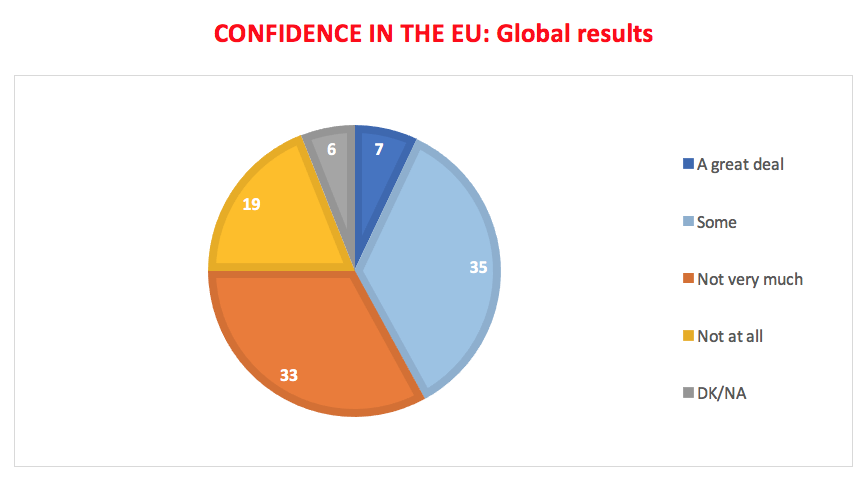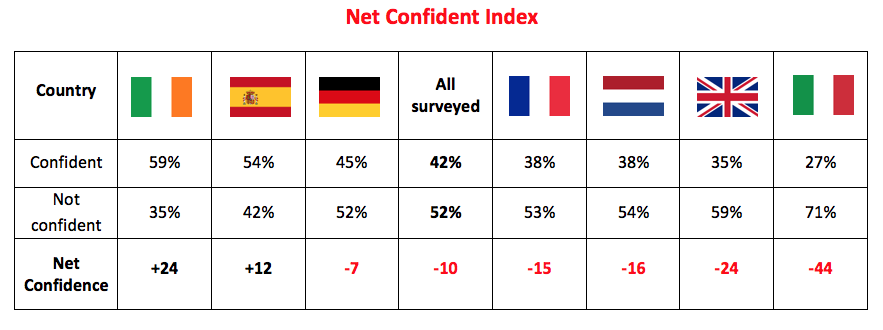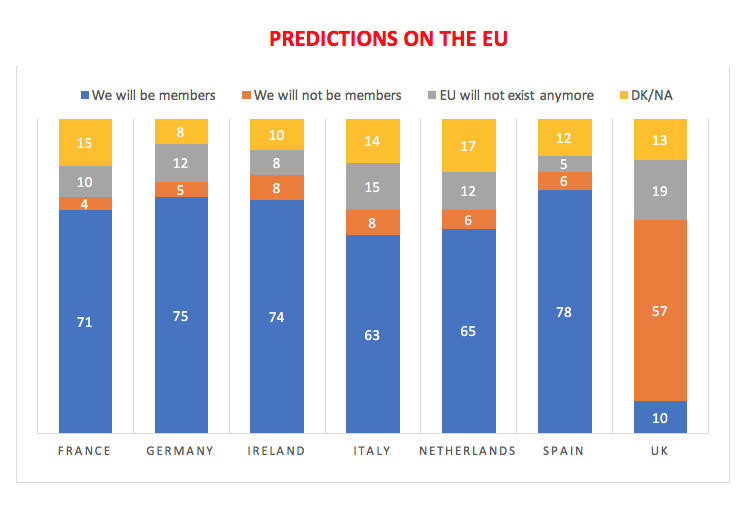The results of a survey carried out by WIN European members within the 2017 GIA End of Year Survey reveals low levels of confidence in the EU – 52% of respondents report that they either do not have very much confidence, or have no confidence at all.
As part of 2017 GIA End of Year Survey, WIN realised a survey in seven European countries, discussing the level of confidence in EU and future perceptions on this organization in a 5 years’ period. The questions were proposed by Doxa, the Italian member of WIN.
The countries involved were France, Germany, Ireland, Italy, Netherlands, Spain and UK. Interesting results from each of the participating countries, with some great differences among them, according to both recent history and historical approached to the European Union.
At a general level, those who declare to have confidence in the EU are just the 42% of the respondents (“A great deal of confidence” 7%; “Some confidence” 35%); the non-confident (“not very much” or “not at all”) prevail with 52%; 6% didn’t know nor answered.

The “Net confidence” Index, calculated with the difference between the percentage of confident and non-confident, corresponds to -10 at a general level. Among the most confident countries we have Ireland (+24) and Spain (+12), while Italy tops the bottom of the list with the highest level of non-confidence (71%) and the lowest net confidence index (-44).
Germany (-7), France (-15), Netherlands (-16) and UK (-24) are all in the negative side of the “net confidence” index, though with very different net results from Italy, at the end of the list.
Despite the country of origin, levels of confidence slightly higher were found among the younger age groups (53% confident in EU up to 24 years old; 46% between 25 and 34 years old) and among those who have achieved higher levels of education (57% among graduates and post-graduates, 49% among secondary school achievers).
The EU in five years from now:
Making predictions in a 5 years’ time, 62% of the total sample thinks that their country will (still) be a member of the EU, while the remaining 38% is split almost equally between the remaining options: 13% thinks that their country will not be part of the EU anymore; 12% thinks the EU will not exist anymore; 13% does not know / does not answer.
It has to be noted that the global result of 62% is very negatively influenced by the only 10% of respondents in UK who consider their country will remain a member of EU – clearly a direct consequence of the outcome of the Brexit referendum and political decisions which followed.
The remaining 6 countries (four of them being also among the founding countries of EU – France, Germany, Italy and the Netherlands) show a similar response pattern among them, variating from the 63-65% in Italy and the Netherlands, up to a 75-78% in Germany and Spain, with very close results also in France (71%) and Ireland (74%).
Access the full tables here, and information on the sample demographics here.
__________________________________________________________________________________
Methodology:
The survey was conducted in 7 European countries and the sample has been superior to 7,000 online interviews (around 1000 respondents per country, half men and half women; see details below and in the attached tables). The margin of error for the survey is between +3-5% at 95% confidence level. Fieldwork has been carried out by the members of WIN in their respective countries between October and December 2017.
Sample specification:
France 1,066 surveyed by BVA
Germany 1,000 surveyed by Produkt + Markt
Ireland 1,001 surveyed by Red C Research and Marketing
Italy 1,007 surveyed by DOXA
Netherlands 1,027 surveyed by Motivaction International
Spain 1,016 surveyed by Instituto DYM
United Kingdom 1,004 surveyed by Opinion Research Business (ORB)
The survey featured two questions:
- “Thinking about the EU. Overall how much confidence do you have in the EU”
- “Thinking about 5 years from now, do you think your country will be a member of the EU, will it exist outside the EU or perhaps you think the EU will no longer exist in 5 years’ time?”


